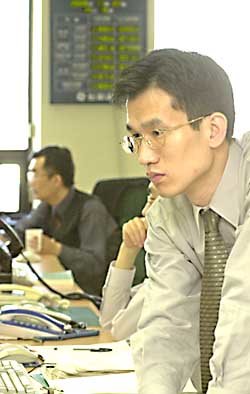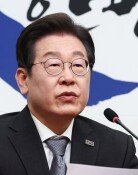Won falls to year`s low; firms revise biz plans for next year
Won falls to year`s low; firms revise biz plans for next year
Posted November. 22, 2000 19:28,

The won¡¯s rapid depreciation against the U.S. dollar has plunged the entire industrial world into utter confusion. The won¡¯s exchange rate against the dollar continued to rise Wednesday, closing at 1,176.90 won per dollar, the highest figure this year.
Amid the deteriorating value of the Korean currency, enterprises are busy preparing to cope with the trend and modifying their business plans for next year.
However, exporting companies appear to be welcoming the won¡¯s drop at the moment, believing it will help them make ends meet.
The Korean International Trade Association (KITA) Wednesday analyzed that a 10-percent depreciation of the won will increase exports by US$2 billion won over the coming three years.
It observed that exports would increase by 4.29 percent this year, 2.14 percent next year and 0.72 percent in 2002 in case of a 10-percent drop in the won¡¯s value.
Electronics manufacturers that export about 60-80 percent of all their products expect the sharp appreciation of the dollar to boost their competitiveness in the international market.
But the unstable exchange rate makes it difficult for exporters to draft plans for next year, set the prices for new products and decide on the timing for negotiations on prices and other issues. Unless the exchange rate is stabilized, buyers will tend to shun the purchase of Korean goods, making it more difficult to decide on the prices of exported items, according to KITA officials.
Yoo In-Yul, a director of the KITA, said, ¡°If the exchange rate rises, buyers demand price cuts as a matter of course. Yet exporters cannot accept the demand that easily because they have to make an estimate of the rate at the time of settlement.¡±
Yoo pointed out that friction with buyers of low- and medium-priced goods and fierce competition with Chinese products may cause a reduction in Korean firms¡¯ exports in the long term.
Importers are suffering as due to the recent slump in domestic consumption, they are unable to increase the sale prices of their goods to correspond with the increase in import prices caused by the won¡¯s devaluation.
Major conglomerates mapping out next year¡¯s business programs are facing difficulties in confirming them due to the sharp rise in the exchange rate.
Samsung Group earlier set the basic rate at 1,050-1,100 won, but has no choice but to modify the plans completely if the current trend continues, an official said.
Other companies are no exception in that they have to change their business goals according to the exchange rate with most of them relying heavily on exports.
Headline News
- Yoon removed from office by unanimous court decision
- Constitutional Court mentions responsibility of both Yoon and National Assembly
- Won-dollar rate falls to 1,430 range after impeachment ruling
- Teacher with spinal cord injury transforms into career counselor
- U.S. redeploys Patriot missiles from S. Korea without replacement forces







